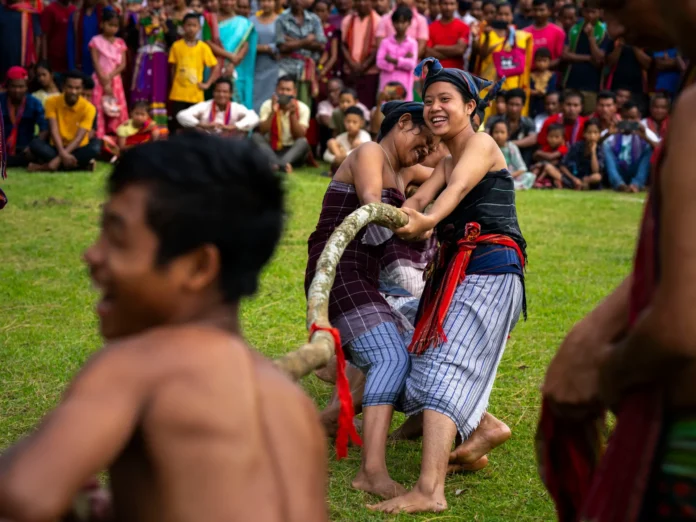The Rabha community of Assam came together in large numbers on Tuesday to celebrate the Baikho Festival at Dudhnoi, Goalpara district. The festival, observed with great devotion and festive enthusiasm, marks a traditional prayer for good harvest, rainfall, and community well-being.
Celebrating its 26th year in Dudhnoi, the Baikho Festival has become a significant annual event showcasing the rich heritage of the Rabhas, a prominent indigenous group in Assam.
Rituals and Offerings Begin the Celebrations
The festival began early morning with sacred rituals and sacrificial offerings to Goddess Baikho, the protector of crops and natural harmony. Pigs and chickens were ritually sacrificed, as per age-old customs, seeking divine blessings for fertility and abundance.
Community elders led the ceremonies, chanting ancient hymns and invoking the goddess to shield the people from misfortune and to bring timely rain for agriculture.
“We preserve this tradition as a gift from our ancestors,” said village elder Arjun Rabha. “It connects us to nature, to the soil, and to each other.”
Cultural Programmes Reflect Rabha Identity
The Baikho Festival is not just about rituals—it is a vibrant cultural celebration. Traditional dances like the Bardwi Sikhla were performed by local youth groups in colorful attire. Folk songs echoed across the Dudhnoi fields, reflecting the agrarian lifestyle and spiritual connection of the Rabha community.
Stalls displaying local handicrafts, traditional cuisine, and indigenous medicinal herbs added to the festival’s appeal. Women in traditional Rabha dress prepared rice beer (apong) and millet-based dishes for guests and villagers.
Local schools and cultural clubs also participated, highlighting the role of youth in preserving tribal identity.
Local Leaders and Officials Attend
Prominent leaders, cultural scholars, and government officials attended the festival to show solidarity with the Rabha community. Goalpara Deputy Commissioner Dibakar Nath praised the Rabhas for preserving their traditions despite modern pressures.
“This festival promotes not just agriculture, but also cultural tourism in Assam,” he said. “It deserves wider recognition and support.”
The state cultural department also promised financial assistance for organizing such community festivals in the future.
Festival’s Historical and Agricultural Significance
The Baikho Festival has deep roots in Rabha oral traditions. Historically celebrated during the pre-monsoon season, it symbolizes the cycle of sowing and reaping. It also acts as a community gathering to renew social bonds and spiritual strength.
Held annually across Rabha-dominated regions such as Dudhnoi, Boko, and Dudhnai, the festival is closely tied to environmental rhythms and traditional farming wisdom.
Cultural experts note that the Baikho Festival reflects indigenous ecological knowledge and sustainable living—a message increasingly relevant in today’s climate-aware world.
Community Urges Cultural Preservation
Leaders from the All Rabha Students Union (ARSU) emphasized the importance of safeguarding Rabha culture in the face of globalization and migration. They urged younger generations to take pride in their roots and keep the language, rituals, and stories alive.
“We must not forget who we are,” said ARSU leader Malati Rabha. “Festivals like Baikho give us strength, unity, and identity.”
Efforts are underway to document Rabha traditions and secure Geographical Indication (GI) tags for key cultural elements of the tribe.
Call to Action
The celebration at Dudhnoi is a testament to Assam’s diverse cultural landscape. Visitors and locals alike are encouraged to support and experience such festivals, which uphold not only agrarian values but also rich spiritual and community traditions.
For more updates on tribal festivals in Assam, visit the Directorate of Cultural Affairs, Assam and explore related articles at assam.gov.in.
Related Articles:


